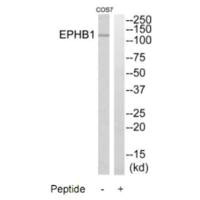EPHB1 Antibody
-
货号:CSB-PA073597
-
规格:¥2024
-
图片:
-
其他:
产品详情
-
产品名称:Rabbit anti-Homo sapiens (Human) EPHB1 Polyclonal antibody
-
Uniprot No.:P54762
-
基因名:EPHB1
-
宿主:Rabbit
-
反应种属:Human
-
免疫原:Synthesized peptide derived from C-terminal of Human EPHB1.
-
免疫原种属:Homo sapiens (Human)
-
克隆类型:Polyclonal
-
纯化方式:The antibody was affinity-purified from rabbit antiserum by affinity-chromatography using epitope-specific immunogen.
-
浓度:It differs from different batches. Please contact us to confirm it.
-
产品提供形式:Liquid
-
应用范围:ELISA,WB
-
推荐稀释比:
Application Recommended Dilution WB 1:500-1:3000 -
Protocols:
-
储存条件:Upon receipt, store at -20°C or -80°C. Avoid repeated freeze.
-
货期:Basically, we can dispatch the products out in 1-3 working days after receiving your orders. Delivery time maybe differs from different purchasing way or location, please kindly consult your local distributors for specific delivery time.
相关产品
靶点详情
-
功能:Receptor tyrosine kinase which binds promiscuously transmembrane ephrin-B family ligands residing on adjacent cells, leading to contact-dependent bidirectional signaling into neighboring cells. The signaling pathway downstream of the receptor is referred to as forward signaling while the signaling pathway downstream of the ephrin ligand is referred to as reverse signaling. Cognate/functional ephrin ligands for this receptor include EFNB1, EFNB2 and EFNB3. During nervous system development, regulates retinal axon guidance redirecting ipsilaterally ventrotemporal retinal ganglion cells axons at the optic chiasm midline. This probably requires repulsive interaction with EFNB2. In the adult nervous system together with EFNB3, regulates chemotaxis, proliferation and polarity of the hippocampus neural progenitors. In addition to its role in axon guidance plays also an important redundant role with other ephrin-B receptors in development and maturation of dendritic spines and synapse formation. May also regulate angiogenesis. More generally, may play a role in targeted cell migration and adhesion. Upon activation by EFNB1 and probably other ephrin-B ligands activates the MAPK/ERK and the JNK signaling cascades to regulate cell migration and adhesion respectively. Involved in the maintenance of the pool of satellite cells (muscle stem cells) by promoting their self-renewal and reducing their activation and differentiation.
-
基因功能参考文献:
- SUMOylation of EphB1 repressed activation of its downstream signaling molecule PKC-gamma, and consequently inhibited neuroblastoma tumorigenesis. PMID: 29550816
- investigate NET could modulate one's attention orientation to facial expressions, we categorized individuals according to the genotypes of the -182 T/C (rs2242446) polymorphism. Our results indicated that the -182 T/C polymorphism significantly modulated attention orientation to facial expressions, of which the CC genotype facilitated attention reorientation to the locations where cued faces were previously presented. PMID: 27541794
- some of the mutations found in EPHB1 may contribute to an increased invasive capacity of cancers. PMID: 28108514
- Association of EPHB1 rs11918092 with symptoms of schizophrenia in Chinese Zhuang and Han populations. PMID: 27028544
- The tumor-suppressor function of EphB1 is clinically relevant across many malignancies, suggesting that EphB1 is an important regulator of common cancer cell transforming pathways. PMID: 25944917
- In medulloblastoma cell lines, EphB1 downregulation or knockdown reduced cell growth, viability, cell-cycle regulator expression, and migration, but increased radiosensitivity and the percentage of cells in G1 phase of the cell cycle. PMID: 25879388
- Our results indicate that EphB1 may be involved in carcinogenesis of renal cell carcinoma PMID: 25120806
- The genes CD248, Ephb1 and P2RY2 were detected as the top overexpressed in GC biopsies. PMID: 24716914
- The study presents the first structure of the EphB1 tyrosine kinase domain determined by X-ray crystallography to 2.5A. PMID: 24677421
- EphB1 and Ephrin-B could be regarded as independent good prognostic factors and important biological markers for Squamous cell/adenosquamous carcinoma and adenocarcinoma of gallbladder. PMID: 24606480
- Our data indicate that loss of EphB1 protein is associated with metastasis and poorer survival in patients with serous ovarian cancer PMID: 24427352
- Low EphB1 expression is associated with glioma. PMID: 24121831
- EphB1 stimulation triggered approximately 50% serine-threonine PTEN dephosphorylation and PTEN-Cbl complex disruption, a process requiring PTEN protein phosphatase activity. PMID: 23118026
- No association is found for EPH receptor B1 and susceptibility to schizophrenia. PMID: 21041834
- EPHB1 polymorphisms may be associated with susceptibility to hepatocellular carcinoma in the Korean population. PMID: 21763378
- Data show that EphB receptors interact with E-cadherin and with the metalloproteinase ADAM10 at sites of adhesion. PMID: 21804545
- analysis of EphB1, EphB2, and EphB4-binding peptides interaction with antagonists with ephrin-like affinity PMID: 15722342
- The ubiquitin ligase Cbl induces the ubiquitination and lysosomal degradation of activated EphB1, a process requiring EphB1 and Src kinase activity. PMID: 18034775
- Transgenic EphB1 and ephrin-B3 cooperatively regulate the proliferation and migration of neural progenitors in the hippocampus. PMID: 18057206
- Loss of expression of EphB1 protein in gastric carcinoma is associated with invasion and metastasis PMID: 18424888
- EphB1 may have roles in the pathogenesis and development of colorectal cancer. PMID: 18931529
显示更多
收起更多
-
亚细胞定位:Cell membrane; Single-pass type I membrane protein. Early endosome membrane. Cell projection, dendrite.
-
蛋白家族:Protein kinase superfamily, Tyr protein kinase family, Ephrin receptor subfamily
-
组织特异性:Preferentially expressed in brain.
-
数据库链接:
HGNC: 3392
OMIM: 600600
KEGG: hsa:2047
STRING: 9606.ENSP00000381097
UniGene: Hs.116092
Most popular with customers
-
-
YWHAB Recombinant Monoclonal Antibody
Applications: ELISA, WB, IF, FC
Species Reactivity: Human, Mouse, Rat
-
Phospho-YAP1 (S127) Recombinant Monoclonal Antibody
Applications: ELISA, WB, IHC
Species Reactivity: Human
-
-
-
-
-





















